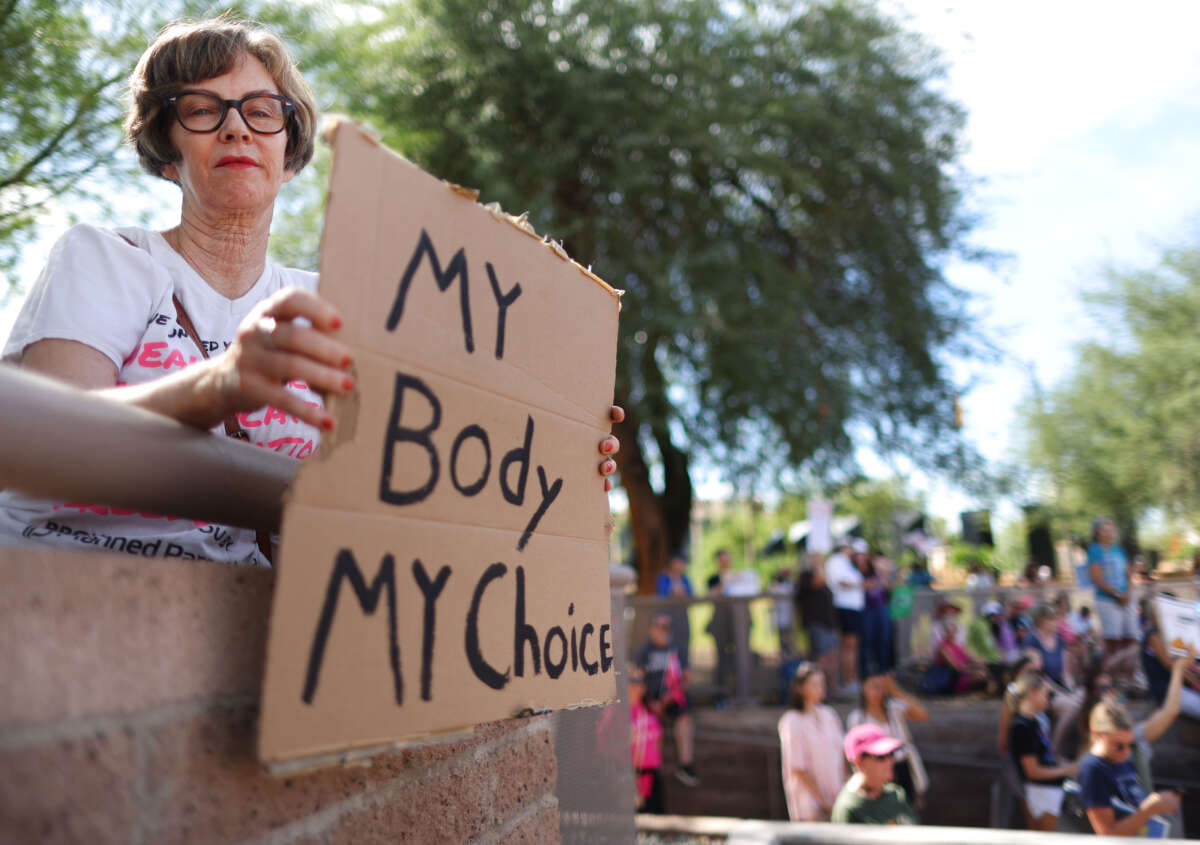The Arizona state Supreme Court heard oral arguments on Tuesday regarding an anti-abortion law that has been on the books since the time the state was a territory.
The 1864 law, passed nearly half a century before Arizona was even a state, forbids abortions at all stages of a pregnancy unless the life of a pregnant person is at risk. It’s currently being enforced in tandem with a different 15-week ban on abortion, which was passed in 2022.
The 1864 law — which includes a two-year prison sentence for any abortion provider — was reaffirmed by the state legislature in the early 1900s after statehood. It was initially blocked by a court order in 1972, but never formally deemed unconstitutional. In 1973, the federal Supreme Court case Roe v. Wade went into effect, creating nationwide protections for abortion rights but leaving several state laws, like this one, technically on the books.
In 2022, when it appeared that Roe would be undone by the current, far right version of the federal Supreme Court, the state legislature passed a 15-week ban on abortion, which went into effect after the Roe decision was undone in Dobbs v. Jackson Women’s Health Organization. But the 1864 law was still technically legal, too, which created confusion over which law should take precedence.
A state appeals court subsequently “harmonized” the two laws, enforcing the 15-week ban for doctors and stating that the 1864 law would apply to non-physician providers of abortion, effectively making it illegal for abortion clinics to exist in the state. Planned Parenthood sued, and in August of this year, the state Supreme Court agreed to hear challenges to the 1864 law.
On Tuesday, it appeared that lawyers for both sides of the case were in agreement that both laws could exist. They differed, however, in their beliefs over which law was more enforceable. Anti-abortion lawyers in the case believed the 1864 law should supersede the 15-week ban, whereas pro-abortion lawyers argued in favor of allowing the 15-week ban to apply to every abortion provider in the state, not just doctors.
Attorneys representing Planned Parenthood in the case expressed the importance of overturning the archaic, nearly 160-year-old law restricting abortion access.
“This effort to reimpose an extreme criminal abortion ban has no basis in the law and is reckless,” Attorney Aadika Singh from the Public Rights Project said. “We live in a 21st century society, not the 1860s. The ability of pregnant people to make decisions about their health, their fertility, their families, and their lives is central to ensuring personal autonomy and equality under the law.”
“I remain firmly committed to ensuring that people in this state have the right to make their own reproductive health decisions,” said Pima County Attorney Laura Conover, another member of the abortion rights legal team. “We hope the Arizona Supreme Court will maintain Arizona’s current laws.”
It’s possible that abortion rights could be extended further in Arizona in the near future. Supporters of abortion rights are pushing for a ballot initiative in the state, to appear in the 2024 election, that would allow voters to pass a constitutional amendment protecting access to the procedure.
The ballot initiative would “establish a fundamental right to abortion” and guarantee that the state couldn’t “deny, restrict or interfere with” a person’s right to have an abortion anytime before fetal viability, which is generally understood to be somewhere between 22-24 weeks of a pregnancy. It would also protect the right to access an abortion after that point if a person’s life or health is at risk because of a pregnancy, to be determined by their health care provider.
5 Days Left: All gifts to Truthout now matched!
From now until the end of the year, all donations to Truthout will be matched dollar for dollar up to $50,000! Thanks to a generous supporter, your one-time gift today will be matched immediately. As well, your monthly donation will be matched for the whole first year, doubling your impact.
We have just 5 days left to raise $50,000 and receive the full match.
This matching gift comes at a critical time. As Trump attempts to silence dissenting voices and oppositional nonprofits, reader support is our best defense against the right-wing agenda.
Help Truthout confront Trump’s fascism in 2026, and have your donation matched now!
